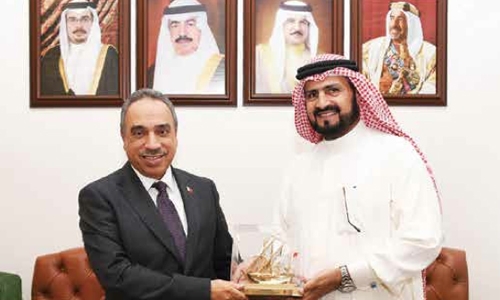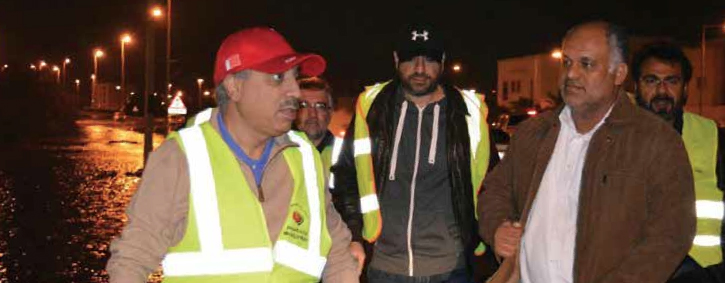Big projects for bright future
The progress of a country is often judged by the changing landscape and cityscape which tells the story of sound urban planning and also of development. As the Kingdom of Bahrain continues to grow and spread its wings under the rule of His Majesty King Hamad bin Isa Al Khalifa, positioning itself among the fastest growing countries in the world in the past two decades, the responsibility of ensuring that the Kingdom keeps pace with proper infrastructure comes under the Ministry of Works, Municipalities Affairs and Urban Planning, headed by Minister Engineer Essam Khalaf.
In an interview with DT News, the Minister outlined his team’s work for tackling the recurrent problem of rainwater flooding in the winter months and what the growing traffic patterns mean and new road networks being built to cope with Bahrain’s growth. Huge budgets have been allocated to ensure the smooth development and plenty of effort and thought has been poured into the process.
DT News: Your Excellency, as the rainy season approaches, some may have concerns about the accumula- tion and drainage of rainwater. What are the ministry’s plans this year to tackle the recurring rainwater flooding issue?
Eng. Khalaf: The ministry deals with the sewerage networks as a top priority, as it has several hazardous and direct effects on the public’s safety, in regards to the environment and health.
But this doesn’t mean that efforts are not being taken to solve the rainwater accumulation issue. Over the years, we have created a map of the water accumulation areas following each rainy season, so we would have a clearer work plan to deal with this matter ahead of the next season. Around 1, 000 sites were detected last year and they were dealt with efficiently.
The ministry worked on establishing bundles of limited rainwater drainage networks. Tenders were offered to construct each bun- dle of networks in different areas, making it easier to control them.
Construction of half of these bundles was completed. However, establishing such networks may be a difficult task in some areas, depending on its capacity. Therefore, we have installed huge underground containers to collect the excessive rainwater on the roads and discharge it later.
These containers are known as holding tanks. The sizes of these tanks depend on the availability of underground space, as other buried infrastructural facilities and pipes limit the sizes of holding tanks. In some areas, 1,000 m3 tanks are required, while the available space only allows to fit 500 m3 tanks or less. This is one of the difficulties we are facing.
On the bright side, this method was proven successful in many sites, such as the parking spaces of Sabeeka Al Ansari Mosque in Isa Town, to mention an example of its efficiency. The ministry successfully coordinated with the Sunni Endowments Directorate in Justice, Islamic Affairs and Endowments Ministry to implement the project on this site, eradicating the repeated rainwater flooding issue in the area once and for all.
Additionally, the holding tanks technique is much cheaper than the rainwater drainage networks, which require pumps, pipes and other costly equipment. The holding tanks are eco- nomical and very efficient in dealing with reasonable amounts of rainwater. But, in case of heavy downpours, these tanks may get filled to capacity and the accumulated water would resur- face to the roads, requiring additional efforts.
DT News: Does the ministry have any plans to benefit from or recycle the excavated rainwater?
Eng. Khalaf: The storm water is usually discharged in the sea and other areas. We had attempted to inject it in the under- ground water in a couple of sites across the Kingdom. But recycling also is only done if strict rules are followed. The Supreme Council for the Environment had some environ- mental reservations in regards to this process as they had some concerns over water pollution suspicions, hence the processes were stopped and further discussions are in progress. But, we utilise it in irrigation purposes.
We have more work and effort to be implemented in the field of rainwater drainage and recycling. Yet, we have managed to considerably reduce the negative effects of this issue on the public by taking the necessary precautionary measures and procedures ahead of the rainy season.
The ministry has offered more tenders to provide tanks and containers to excavate the excessive water from roads and public areas. We have also upgraded the vacuum tankers and provided them with additional pumps to accelerate the process of excavating the water, that’s in addition to installing pumps at vital areas and roads to move the water to open areas and ensure that the daily life isn’t affected.
DT News: What are the main challenges the ministry is facing in tackling the rainwater flooding issue?
Eng. Khalaf: One of the biggest challenges we face during the rainy seasons is the uncivil behaviour of some people who remove the covers of sewage manholes and allow the rainwa- ter to enter and mix with the sewerage network.
This is a grave matter as such behaviour disrupts and dam- ages the networks. The rainwater, with all its sediments, damages the pumps and other equipment of the sewerage network. This results in the rebound of the sewerage inside homes and other facilities. Such cases were reported recently, as the pumps were damaged and unable to move the sewer- age to the treatment plant. We repeatedly warn the public
of the dangerous effects of such behaviours by raising more awareness on the matter through different platforms.
It’s noteworthy that we have also fulfilled all the requests that were received by municipal councils from citizens this year to install rainwater roof coatings to prevent any leakages inside homes, especially those belonging to the limited and medium income citizens.
DT News: What are the efforts taken to reduce the increasing traffic congestions on the Kingdom’s roads?
Eng. Khalaf: The infrastructure and urban growth is notice- ably expanding in the country. The growing economy and the numbers of construction permits being issued is also rising. Of course all of these factors increase the pace of transporta- tion, reflected in the growing numbers of vehicles on the roads.
In Bahrain, we have an annual growth in traffic movement of five to seven percent. The ministry is working on developing a network of strategic roads and a number of big projects are underway. They’re mostly funded either through the state budget or the GCC Marshall Plan.
The in-hand projects are worth around USD1.2 billion, but they require time to be completed. For this reason, as directed by the Crown Prince, Deputy Supreme Commander and First
Deputy Prime Minister HRH Prince Salman bin Hamad Al Khalifa, the ministry has adopted a plan to implement smaller projects that have a visible impact on the alleviation of the traffic congestions issue.
We have commenced executing these projects on several stages. The first stage includes 11 projects to open new entries, exits and intersections. Eight of them were recently completed in all four governorates. This plan received a positive interac- tion from motorists as it effectively contributed to the reduc- tion of traffic jams.
The second stage of the plan will include 16 projects that will be soon announced.
DT News: As we speak about traffic jams, what is the work progress of the much-anticipated fourth bridge connecting Manama and Muharraq?
Eng. Khalaf: This is one of the most prominent projects being currently implemented by the ministry and is financed by the GCC Marshall Plan. It is part of the Muharraq Ring Road project and connects the northern parts of the Capital, Bahrain Bay and Busaiteen reaching to Diyar Al Muharraq.
We have set a budget of USD250 million for the project. Tenders have been offered for the reclamation process and it’s currently in the evaluation phase. We are hoping that the tender for the construction process would be offered by the first half of 2018.
A state-of-the-art design has been approved by the Prime Minister HRH Prince Khalifa bin Salman Al Khalifa. The project would be ready by the year 2020.
Related Posts


